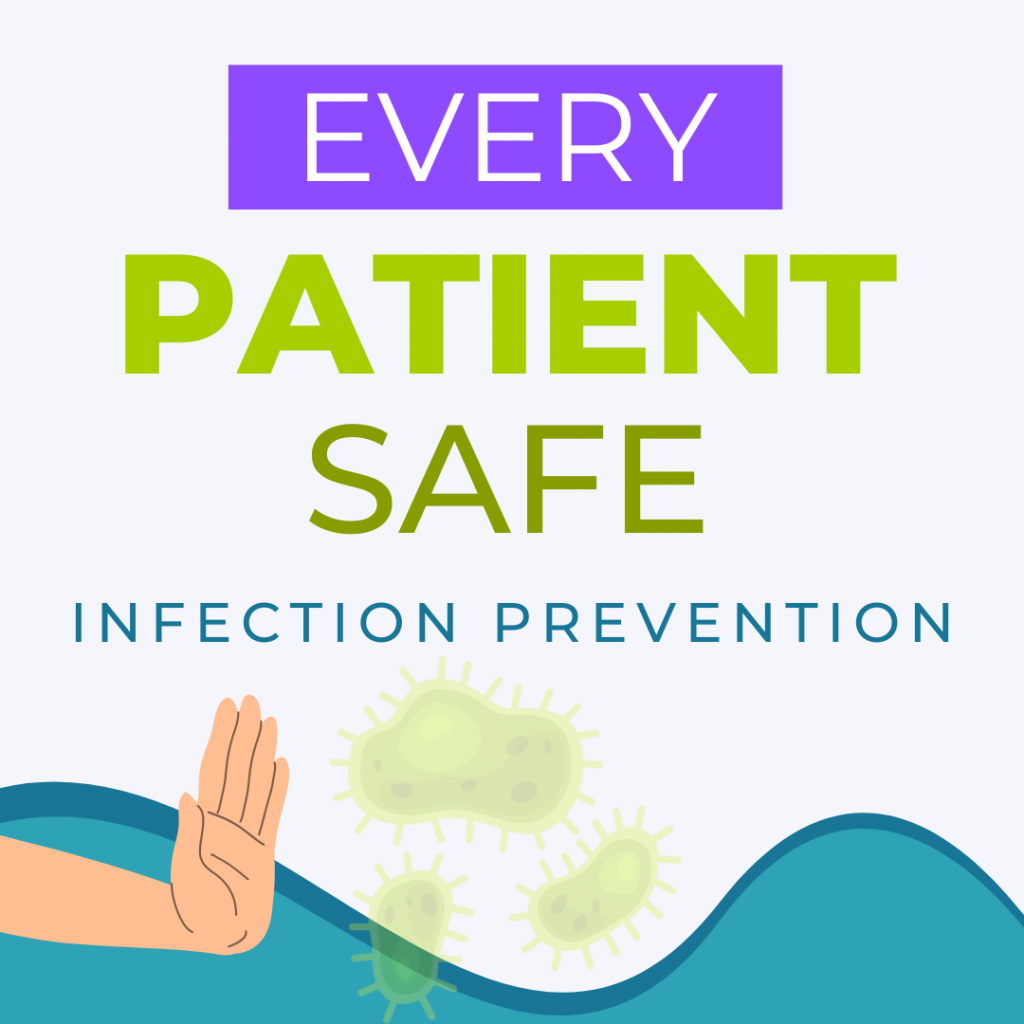Maintaining a strong infection prevention routine is key to staying as healthy as possible!
As a person managing kidney disease, your risk of infection is generally higher than that of the general population due to several factors associated with your condition and treatment. Kidney disease can weaken the immune system, making it harder for your body to fight off infections.

There will be disruptions in life! Preparing for these potential disruptions while managing kidney disease requires proactive health measures, close communication with your healthcare providers, and proper planning. By staying prepared, informed, and connected, you can reduce the risks and challenges posed by unexpected disruptions, such as hospitalizations or future pandemics, while living with kidney disease.
STAY PREPARED:
Maintain basic health practices:
- Wash your hands regularly with warm water and soap
- Monitor your dialysis access – assess for fever, redness, pain at the catheter or fistula site
- Wear masks when needed
- Avoid crowded places when possible
- Keep your home clean, especially if you are using dialysis equipment at home such as with home hemodialysis (HHD) and peritoneal dialysis (PD)
- Stay physically active by engaging in daily movement
- Avoid smoking or consider quitting if you actively use tobacco
- Limit alcohol intake
- Maintain good sleep
- Develop stress reduction techniques to help strengthen your immune response

Maintain regular medical care:
- Schedule regular visits with your nephrologist (kidney doctor) to monitor kidney function and with your other healthcare providers
- Know your blood pressure, blood sugar, and cholesterol numbers
- Familiarize yourself with telehealth options for virtual appointments in case in-person visits become difficult and/or limited

Stock up on Essentials:
- Keep a stock of essential medical supplies, such as medications, dialysis equipment, or any other necessary items to cover any disruptions in the healthcare system
- Ensure you have an adequate supply of medications, including refills, in case of supply chain disruptions
STAY INFORMED:
Monitor reliable public health guidelines:
- Consider updates from trusted public health organizations (i.e. Centers for Disease Control and Prevention (CDC), World Health Organization (WHO), and your local health departments)
- Visit AAKP website often for helpful information
STAY CONNECTED:
Mental Health and Emotional Wellbeing:
- Stay connected with family, friends, or support groups
- Consider therapy, counseling, or support groups
- Consider joining online communities or forums for people with kidney disease
- Practice mindfulness, meditation, or deep-breathing exercises to reduce stress
Prepare for lockdowns or healthcare disruptions:
- Be aware of how healthcare services may change during a pandemic
- Maintain up-to-date contact information with all your healthcare providers
- Know how to reach your healthcare providers in an emergency and keep contact information handy
Develop an emergency plan:
- If you are on dialysis, make sure to have an emergency dialysis plan, including a list of nearby dialysis centers, transportation options, and a backup treatment facility
- Involve family members, friends, or caregivers in your emergency plan, be certain they know your medical needs and where to find your important medical information. Check out more Emergency Preparedness resources at https://bit.ly/AAKPEmergencyPreparedness.

If you are managing kidney disease, there are some infections you must be particularly mindful of:
- Urinary tract infections (UTIs) – People with kidney disease are more prone to UTIs which can potentially progress to more serious infections like pyelonephritis (kidney infection).
- Pneumonia – Because of a weakened immune system, people with kidney disease are more susceptible to respiratory infections, such as pneumonia, especially if they have other medical conditions like diabetes or asthma.
- Sepsis – A life-threatening response to infections, and a serious concern for persons with kidney disease, particularly if the person is on dialysis. Infections like UTIs or pneumonia can lead to sepsis.
- Hepatitis B and C – These viral infections are more common in persons on dialysis, as the disease can be transmitted through blood. It is important to get vaccinated against Hepatitis B and get regularly screened for Hepatitis C.
- COVID-19 and influenza – Viral infections such as COVID-19 and influenza pose a higher risk of complications, potentially leading to hospitalization or severe respiratory issues.
- Peritonitis – If you undergo peritoneal dialysis, you are at-risk for peritonitis, an infection of the abdominal lining caused by bacteria entering through the dialysis catheter.
- Skin infections – Cellulitis or other skin infections can occur more frequently in people with kidney disease, often because of poor circulation or swelling in the legs.
- Candidiasis – Fungal infections, such as candidiasis (oral or systemic), are more common in people with advanced kidney disease or kidney transplant recipients on immunosuppression medications.
- Tuberculosis (TB) – If you are on immunosuppressant medications, your risk increases your vulnerability to TB.
What are healthcare-acquired infections (HAIs)?
HAIs are also known as nosocomial infections. These are infections that a person acquires during the course of receiving treatment for other conditions in a healthcare setting, such as a hospital, nursing home, or even at an outpatient clinic.
HAIs are usually infections that are typically not present at the time of the admission and they usually develop within 48 hours or more after hospitalization or treatment.
What is peritonitis?
Inflammation of the peritoneum, the thin layer of tissue that lines the inside of the abdomen and covers most of the abdominal organs.
Peritonitis can be life-threatening if not treated and must be treated as soon as possible.
Are persons with kidney disease at-risk for HAIs?
Yes! People with kidney disease have several risk factors that contribute to an increased risk for developing an HAI:
- Frequent medical visits and procedures which increases exposure to potential sources of infection.
- Since kidney disease can weaken the immune system, a compromised immune system can make it harder for the body to fight infections.
- Use of immunosuppressive medications. Your immune system is deliberately weakened to prevent organ rejection and makes a person more vulnerable to opportunistic infections in healthcare settings.

What are catheter-related bloodstream infections (CRBSIs)?
CRBSIs are infections that occur when bacteria or other pathogens enter the bloodstream through a catheter.
Are patients with kidney disease at-risk for CRBSIs?
Yes! Persons on long-term dialysis require a vascular access for months or even years contributing to long-term exposure to potential CRBSIs. If you are on dialysis, particularly hemodialysis, there is an increased risk of infections at the site where the dialysis access is placed.
Pathogens can enter the bloodstream if sterile techniques are not properly followed and sometimes, even when sterile techniques are used. It is important proper hygiene is maintained during any manipulation of the dialysis catheter.
What are some of the consequences of CRBSIs?
- Hospitalizations
- Feeling very ill
- Sepsis
- Loss of access site
What are some ways to prevent CRBSIs?
- Use of arteriovenous (AV) fistulas or grafts
- Following strict aseptic techniques when accessing dialysis catheters
- Regular catheter site care
- Early recognition of infection (i.e. redness, swelling or pain at the catheter site, fever)
Innovations in Infection Prevention!
Among hemodialysis patients covered by the Centers for Medicare and Medicaid Services (CMS), CRBSIs occur at an alarming rate of nearly 25,000 patients per year at a cost of an additional more than $3 billion to treat.
The U.S. Food and Drug Administration (FDA) recently approved a taurolidine/heparin catheter lock solution (DefenCath®). This drug product is the first and only FDA-approved antimicrobial catheter lock solution (CLS). It is indicated to reduce the incidence of catheter-related blood stream infections (CRBSIs) at a demonstrated rate of 71 percent.
Special considerations related to Coronavirus 2019 (COVID-19) infection for persons managing kidney disease:
- COVID-19 can cause acute kidney injury (AKI) – even in patients without a history of kidney disease. AKI is a sudden episode of kidney failure or damage that happens within a few hours or days.
- Studies have shown that up to 30% of hospitalized COVID 19 patients develop AKI, with severe cases more likely to experience this complication.
- Severe COVID-19 cases, particularly those requiring intensive care or ventilator support, are more prone to AKI, which can increase the risk of long-term kidney damage.
- COVID-19 may also worsen CKD, potentially leading to faster progression of the disease.
- Kidney transplant recipients are at higher risk of severe COVID-19 illness because of immunosuppressive medications, which prevent organ rejection but lower their ability to fight infections.
What is the mechanism of kidney damage in COVID-19?
- Direct viral damage – the COVID-19 virus expresses a specific protein (ACE2 receptors) that directly enters and infects the kidney cells. This is the same receptor the COVID-19 virus uses to enter lung cells.
- Cytokine storm – the body’s immune response to the virus, especially in severe cases, can trigger a “cytokine storm” leading to widespread inflammation in the body, including in the kidneys.
- Coagulation abnormalities – COVID-19 is associated with blood clotting disorders, which can impair blood flow to the kidneys, causing damage.
- Dehydration and low oxygen levels – respiratory issues and other complications can result in dehydration and reduced oxygen delivery to organs, including the kidneys, contributing to kidney injury.
Small changes add up!
Being prepared, informed and connected will empower you to manage your kidney health.
PATIENT STORIES:
Nearly every patient on dialysis or living with a transplant is aware of the risks and consequences of healthcare associated infections (HAI), including extended hospitalizations, missed work, disability, and heavy emotional burdens on family members and caregivers. Infection prevention is a critical aspect of care for dialysis patients, as they are more vulnerable to infections due to their underlying kidney disease and the mere nature of dialysis treatments. Through AAKP’s “Every Patient Safe” campaign, we’re sharing personal stories and real-life perspectives of infection scenarios and prevention strategies.
Additional Resources
- AAKP Pocket Guide to Managing Infection Risks for Dialysis Patients with Central Venous Catheter (CVC) Access (Download Brochure)
- CDC Conversation Starter to Prevent Infections in Dialysis Patients (Download Brochure)
- AAKP Emergency Preparedness Resources (Access Webpage)
- Why Government Determinants of Health Must Not Impede Long-Term Access to Infection Prevention Innovations (Read Article)
- AAKP Innovator Series Features CorMedix, Inc. (Read Article)
- AAKP Patient Profile: Sepsis Awareness Month – AAKP Ambassador Dawn Edwards (Read Article)
- Kidney Group Unveils Risk Campaign During National Safety Month (Read Press Release)
- Kidney Patients Honor Top Physician for Disease and Infection Prevention (Read Press Release)
- CDC and AAKP Launch Partnership to Limit Dialysis-Related Bloodstream Infections (Read Press Release)
- We are Listening: The Role of Patient Consumers in Innovation (Watch OnDemand)
- COVID, Bird Flu, and Emerging Viruses (Watch OnDemand)
- Innovations in Home Dialysis and Remote Monitoring Technologies (Watch OnDemand)
- Advancements in Dialysis Care: Access Innovation and Safety (Watch OnDemand)
This AAKP patient education web page is supported by an educational donation by CorMedix, Inc. The educational content shown is unbranded and unbiased and has not been determined or influenced by any sponsor(s). It’s intended for educational purposes only.



























